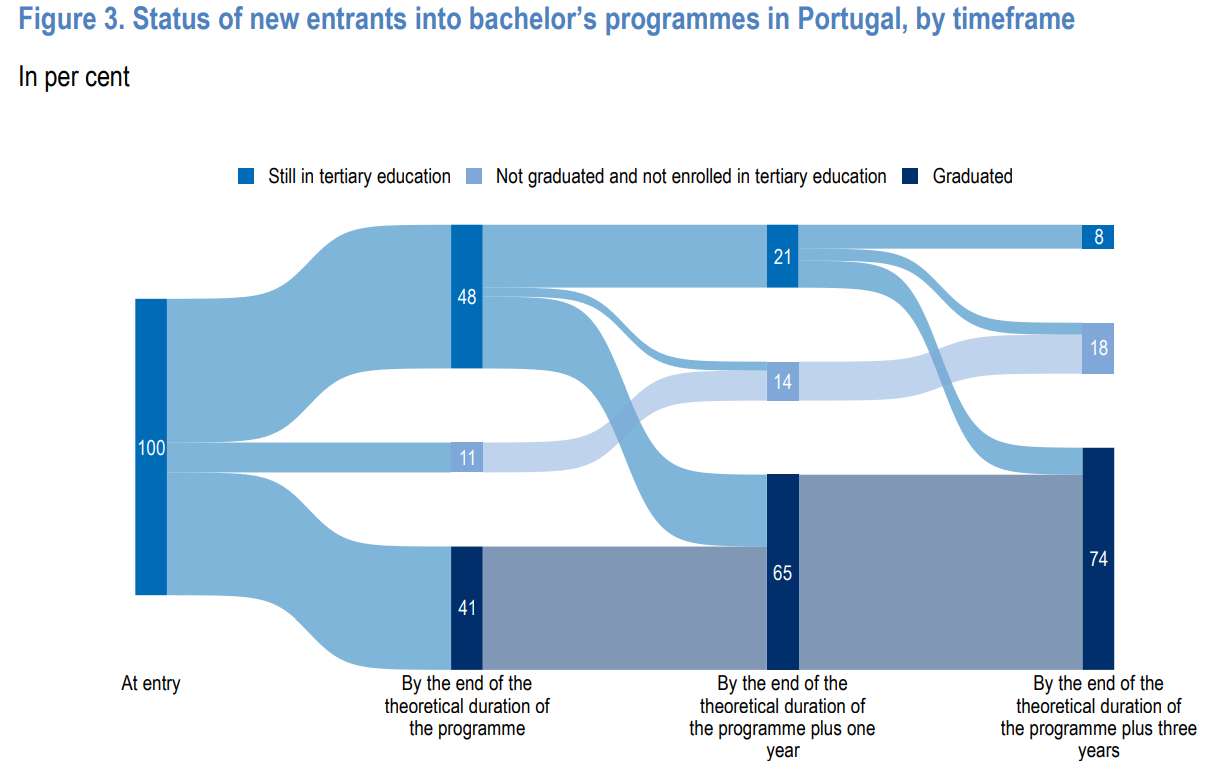Less than half of Portuguese students graduate in three years

Of the thousands of students who enroll in undergraduate programs in Portugal each year, only four in ten graduate within the expected timeframe. This is the picture outlined by the Organization for Economic Cooperation and Development (OECD) in this year's "Education at a Glance" report.
"Completion rates reflect the share of new undergraduate enrollees who successfully obtain their higher education degree within specified timeframes. These rates remain low in most OECD countries ," the organization began by emphasizing in the report released this Tuesday.
Portugal is among the countries that make up this majority: here, only 41% of students who enroll in undergraduate programs complete their courses within the theoretical duration . In comparison, the OECD average is 43% .
However, if we also consider students who complete their degree one year later than expected, the completion rate in Portugal rises to 65% , exceeding the OECD average of 59%.

If we also consider students who finish their course three years after the expected deadline , the completion rate rises to 74% in Portugal and 70% in the OECD .
This means, all things considered, that even six years after entering higher education, 26% of Portuguese students have not completed their course : of these, the majority (18%) are no longer enrolled in the degree course.
Incidentally, the OECD points out that students can leave their studies at various stages , and that high dropout rates in the first year of the course “may signal a mismatch between students’ expectations and the content and demands of the courses , possibly reflecting a lack of career guidance and insufficient support”.
The good news is that, in Portugal, 8% of students drop out of their degree in the first year , a rate lower than the OECD average (13%).
Chile and Ireland at the extremes
Among the various OECD countries, Chile stands out with the lowest on-time completion rate. In that country, only 13% of students complete their degrees within the theoretical timeframe. Colombia (16%), Austria (21%), and the Netherlands ( 30%) also deserve mention.
In contrast, in Ireland, 68% of students complete their course on time . In the UK, the completion rate is 67%. And in Turkey, it's 64%.
On the other hand, in a gender analysis, the OECD indicates that, across all countries, the percentage of female students completing their bachelor's degree is higher than that of male students within the expected timeframe. The difference between their graduation rates and their male counterparts is 11 percentage points, a gap identical to that recorded in Portugal.
Regarding different fields of study, "Education at a Glance" highlights that completion rates "vary from field to field." In Portugal, the completion rate for STEM (science, technology, engineering, and mathematics) degrees is around 61%, while in Health it exceeds 80%.
International students on the rise
Higher education student mobility continues to increase , according to this year's "Education at a Glance" report. On average, 7.4% of tertiary education students (which includes higher education) are now international .
" Portugal registered an increase, from 7.9% in 2018 to 13.3% in 2023 ," details the OECD, an organization that indicates that a large portion of foreign students arriving in Portugal come from Africa (42%) and Latin America and the Caribbean (30%) . "This reflects the historical and cultural ties , as well as the importance of the language of study ," reads the aforementioned report.
On the other hand, the OECD reports that in Portugal the percentage of students taking a gap year between secondary and higher education is lower than average (39% versus 44%). But it offers no explanation.
The report published this Tuesday also leaves some notes on the shortage of teachers in Portugal , highlighting that the lack of teachers at the start of or during the school year is a “ growing concern ” in several OECD countries.
The aging of teachers could exacerbate this problem, says the organization, which indicates that, in Portugal, the percentage of teachers aged at least 50 increased significantly between 2013 and 2023 , now exceeding the 50% mark.
ECO-Economia Online





